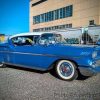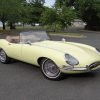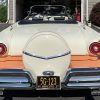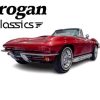1966 Abarth
Description
This 1966 Abarth 1000 SP is one of approximately 50 examples of the sports racing barchetta built to satisfy homologation requirements for FIA Group 4 competition. Chassis 0038 contested the Targa Florio five times between 1970 and 1976, achieving its best result in the event with a second place in the Sports 1000 class in 1974. The car was later relocated to the US by a collector who campaigned it in vintage racing events before it was purchased in 1998 by its current owner. A subsequent refurbishment included a repaint of the fiberglass bodywork in red, refinishing of the steel tube frame, and an overhaul of the mid-mounted 982cc DOHC inline-four. Additional features include twin Weber carburetors, a five-speed manual transaxle, a limited-slip differential, four-wheel disc brakes, coilover independent suspension, staggered-width 13” Campagnolo alloy wheels, and two-place seating upholstered in black. This Tipo SE04 is now offered on dealer consignment in Saint Louis, Missouri, with removed Targa Florio scrutineering stickers from the 1970s, photos from the refurbishment, and a bill of sale. The 1000 SP, or Sport Prototype, emerged in 1966 as the result of a development project started in 1960 and led by Abarth technical director Mario Colucci, a former Alfa Romeo engineer. The model achieved homologation for Group 4 competition in 1968 while also accumulating successes in the 1,000cc-and-under prototype class of Group 6. Construction incorporated a steel tubular space frame wrapped in fiberglass and polyurethane open-roof bodywork, while power came from a mid-mounted Abarth engine derived from the Fiat 600 powerplant. This example’s bodywork was stripped to bare fiberglass during the late-1990s refurbishment before being refinished in its current shade of red. The steel tube frame and integrated roll bar were refinished in gray. Features include a wrap-around laminated glass windshield, body-color headlight covers, a single windshield wiper, tripod-mounted side mirrors, louvered front and rear panels, cooling scoops behind each door, and a high-mounted single exhaust exit. Campagnolo alloy wheels are wrapped in Dunlop Racing tires that measure 175/550-13 up front and 4.75/11.50-13 at the rear. Stopping is handled by dual-circuit hydraulic brakes with discs at each corner, while steering is via rack and pinion. The cockpit houses a pair of molded seats padded with black upholstery and equipped with a four-point harness for the driver and a lap belt for the passenger. Additional features include a gated shifter, debossed “Abarth” lettering on the sills, a windshield-mounted rearview mirror, and an electrical cutoff switch. The three-spoke steering wheel is upholstered in black and sits ahead of a 10k-rpm tachometer flanked by Jaeger gauges monitoring oil pressure and coolant temperature. A Jaeger oil temperature gauge is situated to the driver’s right. The car does not have an odometer, and mileage is unknown. The mid-mounted 982cc inline-four features an aluminum cylinder head, dual overhead camshafts, and a pair of dual-throat Weber carburetors for a factory-rated output of 105 horsepower. Cooling is handled by dual radiators with electric cooling fans flanking the engine, a nose-mounted radiator, and a nose-mounted oil cooler. An overhaul of the engine in 2003 by Medina Motorsports in Ohio is said to have included the installation of Arias pistons, a polished and balanced crankshaft, and reconditioned connecting rods as well as the replacement of the gaskets and seals. According to the selling dealer, the car has been used primarily for static display under current ownership and will require sorting prior to track use. Power is sent to the rear wheels via a five-speed manual gearbox and a limited-slip differential. Independent suspension incorporates coilover telescopic shock absorbers and anti-roll bars at front and rear. The car is shown above during the 1971 Targa Florio, and additional photos of the car racing in period are shown in the photo gallery below. Included in the sale are five Targa Florio scrutineering stickers from 1970, 1971, 1972, 1974, and 1976 that are said to have been removed from the car prior to the refurbishment. A collection of photos from the refurbishment performed in the late 1990s and early 2000s can be viewed in the gallery below. The car does not have a title, and it is being sold for off-road use only on a bill of sale.








































